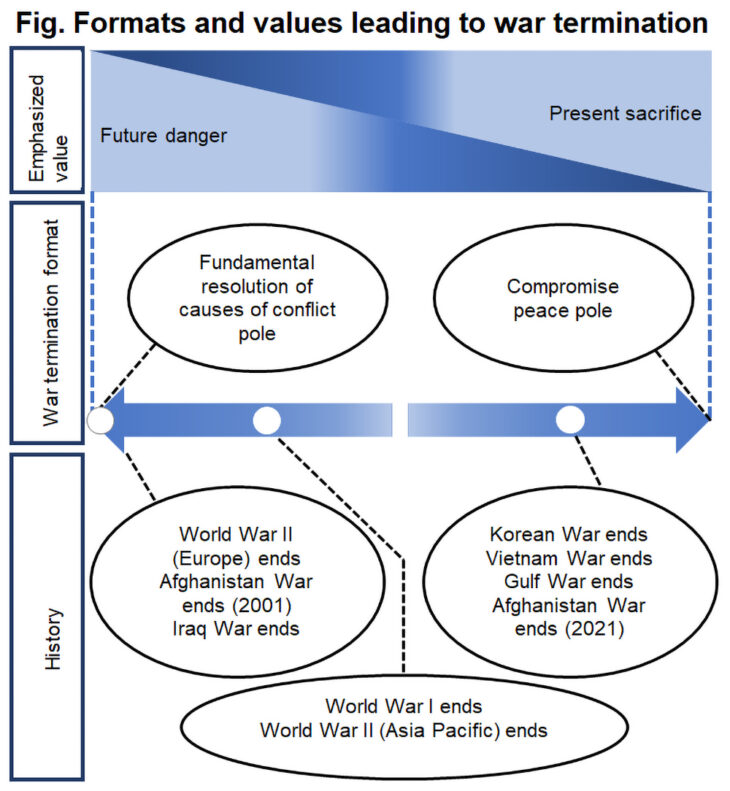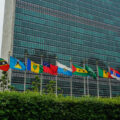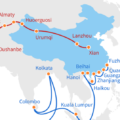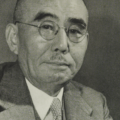Thoughts on How To End Wars
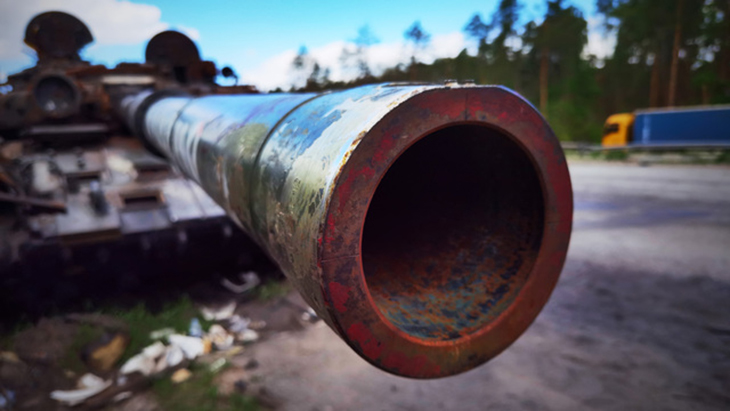
An abandoned tank on the highway in Kyiv region, Ukraine, May 15, 2022. Russia’s invasion of Ukraine with no end in sight.
When will ceasefire talks begin and who will be the mediator?
Photo: sarymsakov / PIXTA
Countries involved in war waver between the pole of fundamental resolution and the pole of compromise peace. Immediate peace is not always the absolute preference. When will ceasefire talks begin and who will be the mediator? This article explores how wars end based on the mechanisms of war and peace.
Chijiwa Yasuaki, Senior Fellow, National Institute for Defense Studies

Chijiwa Yasuaki
It appears that the Russia-Ukraine War will be protracted. Turkish President Recep Tayyip Erdogan has expressed willingness to mediate in ceasefire talks between Russia and Ukraine. Germany, France, Italy and other countries are also exploring options for an early ceasefire, but there have been no significant moves toward war termination.
At the start of the Russian invasion of Ukraine on February 24, observers predicted a quick and overwhelming victory for Russia and exile for the Zelensky government. However, President Volodymyr Zelensky decided to stay in the capital Kyiv and the Ukrainian people chose to resist.
Meanwhile, Russian President Vladimir Putin seems to have no intention of ending the war even after his initial plan failed. On June 29, Avril Haynes, the U.S. Director of National Intelligence, revealed in her analysis that Putin still “remains intent on overrunning most of Ukraine.” Earlier, on June 19, Jens Stoltenberg, Secretary General of NATO, also said that “the war in Ukraine could last years.”
Amid growing fears of a protracted war, the international community is closely watching the future of the war in Ukraine and exploring ways to end it. This article looks at the possible outcomes of the war from the perspective of war termination theory, and considers how to involve diplomacy.
The dilemma of fundamental resolution of the causes of conflict and compromise peace
To start with, how do we explain the protracted Russia-Ukraine war from the perspective of war termination theory?
There are broadly speaking two formats for war termination: fundamental resolution of the causes of conflict and compromise peace. (For more information, see my book, Senso wa Ikani Shuketsushitaka—Nido no Taisen kara Betonamu, Iraku made [How wars ended–from two World Wars to Vietnam and Iraq]).
For the dominant side it is preferable to declare a complete victory and impose unconditional surrender on the weak side. (Here, the choice of the dominant side as the subject is only to simplify the explanation. There is, of course, no intention to support the position of the dominant side.) This is to be able to eradicate the source of any future troubles. I will refer to this as a fundamental resolution to the causes of conflict. One such example is the Allies fighting Nazi Germany until its complete destruction in World War II.
It is believed that Russia, which was initially on the dominant side of the current Russia-Ukraine war, had the following termination format in mind: To overthrow the Zelensky government in the name of denazification, to set up a puppet regime, and to turn Ukraine into a vassal state by conspiring to demilitarize and neutralize Ukraine.
Incidentally, to completely defeat the other warring nation, the dominant side must also be prepared to make sacrifices with a focus on the loss of life. If the priority is to avoid sacrifices, the option is to end the war by compromising with the other side. This is compromise peace as a form of war termination. For example, to avoid sacrifices, the goal of the Multinational Forces in the Gulf War stopped at driving the Iraqi military out of Kuwait. As a result, the Saddam Hussein regime in Iraq was prolonged.
When the Russia-Ukraine war began, the dominant side was aiming for the pole of a fundamental resolution (in the subjective view of the Russian side). However, depending on its attitude, the weak side may sometimes influence the decisions of the dominant side. In fact, the robust resistance of the Ukrainian side, including the assumptions of an advance on Kyiv, created a situation where the sacrifices on the Russian side increased. If the sacrifices on the Russian side continue to increase, the logical assumption is that the pole of compromise peace will be the war termination format for Russia. In other words, the complete withdrawal of all Russian forces from Ukraine.
When making decisions about the format for war termination, the point is whether to emphasize the removal of future danger or the avoidance of present sacrifice. If the emphasis is on the former, the inclination is toward fundamental resolution to the causes of conflict, but if the latter is emphasized, the inclination is toward compromise peace. The difficulty is the trade-off between future danger and present sacrifice. This is what creates dilemmas where war termination is concerned.
Let us apply the abovementioned logic to the Russia-Ukraine war. Based on the experience of the 2008 invasion of Georgia and the 2014 “annexation” of Crimea, and the expectation that there would be no direct military intervention by NATO, Russia believed that they could achieve their objectives with little present sacrifice. Putin’s subjective view appears to have perceived a future danger anchored in the self-centered world view that Ukraine must be a part of the Russian sphere of influence, and that Ukraine could not be allowed to grow closer to the West. This led Russia to aim for a fundamental resolution, i.e., to turn Ukraine into a vassal state.
Ukraine, on the other hand, prioritized the future danger of losing its sovereignty and independence to Russia, choosing not to yield, but to resist with the support of the West and to tolerate present sacrifices. Therefore, Russia shelved its initial objectives, and focused on suppressing eastern and southern Ukraine.
Nonetheless, from the Russian perspective, the pole of a compromise peace, i.e., complete withdrawal from Ukraine, is no easy matter. The ebb and flow of the offense and defense at the eastern and southern fronts in Ukraine suggests that both Russia and Ukraine believe they can continue the war, and that calling a ceasefire now would give the other side the upper hand.
An immediate ceasefire is not always good
Certainly, continuing the war will also increase present sacrifices on the Ukrainian side. However, Ukraine is focused on the removal of the future danger of losing their sovereignty and independence. Above all, the Bucha massacre by Russia, which has come to light since April, made it clear that even if Ukraine surrendered and laid down its weapons to avoid present sacrifices, the country would be exposed to terrible future danger if the Russian army controlled Ukrainian territory. According to a public opinion poll conducted in June, 89% of Ukrainians say that it would be unacceptable for Ukraine to agree to cede territory to Russia in order to achieve peace.
Seen in this light, it is clear that ending war early is not enough, and that the conditions for war termination are important.
It has been pointed out that the peace camp including Germany, France, and Italy, which seeks an early ceasefire, and the justice camp including UK, Poland, and the Baltics, which supports robust resistance by Ukraine, are currently out of step where the termination of the Russia-Ukraine war is concerned. On June 4, the French president Emmanuel Macron incurred the ire of the Ukrainian side when he said that Russia must not be humiliated. The issue is a matter of different values: whether to focus on the cost of continuing the war, which includes not only the loss of life on the Ukrainian side, but also food and energy issues, or not to tolerate the risk of upsetting the international order by allowing the aggressor to gain an advantage.
However, the problem is that talk about a peace camp or a justice camp is apt to become linked to misleading discussions about “peace even if it means bending the rules of justice a little.” In such a case, peace means to coexist with future dangers in exchange for avoiding present sacrifices, which is not a path to be chosen lightly. Rather than peace or justice, the issue is whether to focus on avoiding sacrifices or the removal of future danger.
The outcome of military decisions
Whether the outcome of the Ukrainian war will be the pole of fundamental resolution or the pole of compromise peace (as seen from the Russian side) depends on the future course of the battlefield.
In an interview given on March 27, Zelensky said that the Russian army will be pushed back to the situation before the invasion on February 24. A return to the situation before the war will depend on whether Ukraine can gain the advantage in the battlefield on its own territory and continue to receive effective support from the West. On the other hand, if for argument’s sake the Russian army finds itself on the back foot, we also have to bear in mind that it is not possible to completely dispel the fear that a cornered Russian side will use weapons of mass destruction.
The Russian perspective on the future danger posed by Ukraine smells of obsession, but if the present sacrifices on the Russian side increase, they will have no choice but to compromise. On the other hand, the future danger that Russia poses to the Ukrainian side is great. Therefore, if resistance by the Ukrainian side intensifies, present sacrifice of the Russian side will increase. However, in case the situation goes as far as the recapture of Crimea by military force, it is believed that the Ukrainian side may no longer be able to tolerate present sacrifices.
While not desirable by any means, the outcome might be similar to the format for terminating the Winter War in 1940. At the time, Finland, despite being at a disadvantage, robustly resisted the Soviet army and narrowly retained its independence. However, the country lost about 10% of its national territory to Joseph Stalin. If this format is applied to the Russia-Ukraine war, Ukraine would avoid becoming a vassal state, the Zelensky government would survive, and most of Ukraine would retain its independence, but there would be no prospects for the complete withdrawal of the Russian army from Ukraine. Even if they did not actually cede territory, Ukrainian sovereignty might not completely extend to parts of the east and south.
In addition to the issue of territory, another focal point is the relative weight of Russian insistence on the neutralization of Ukraine (promises that Ukraine will not become a member of NATO etc.) and Ukrainian demands for security guarantees. If Ukraine accepts neutralization in a format that satisfies Russia, there is a high likelihood that the country will become subservient to Russia after the end of the war. On the other hand, the more effective the security that Ukraine demands from the West as compensation for neutralization, the closer it will become to a de facto alliance, which is unacceptable to Russia. The challenge is how to bridge this gap.
In any case, for the Ukrainian side to bring up specific conditions for war termination at this time would be seen as a sign of weakness by Russia, and could force further concessions. Unfortunately, in terms of the proportion of territorial area under its control, Ukraine has not even achieved the Winter War line. The present situation is that it is necessary for the Ukrainian army to fight to push the Russian army back to the line prior to February 24, and to do so, they need the support of the international community.
Possibilities and limits to ceasefire talks and mediation
The specific conditions for war termination, including territory and security, will likely be worked out at ceasefire talks in the future. But, since the war is being fought now, it is unlikely that the realities of the battlefield will be abandoned and that the war will simply end with a series of ceasefire talks.
In the cases of both the Korean War and the Vietnam War, the ceasefire conferences started because the war had reached a stalemate. Where the Ukrainian war is concerned, the focus will be on military settlement as a prerequisite for ceasefire talks. It is also possible that the ceasefire talks will become protracted as was the case with the Korean War and the Vietnam War. The former took about two years, and the latter about five years from the start of the talks to cease-fire and signing the armistice or peace accords.
On these occasions, it is important not to expect too much from mediation. In case of a civil war in a small nation, as was the case with the war in the former Yugoslavia, major nations have leeway for mediation, but when one of the parties is a major power (even a nuclear power) as in this case, third-party mediation is not easy. The reason being that there is scant power to force the parties to adhere to any agreement.
However, this does not mean that mediation is totally meaningless. Mediators can provide opportunities for ceasefire talks if both warring parties wish for it. They can also play a role in avoiding miscommunication between Russian and Ukraine during ceasefire talks. Mediators may also be able to resolve an impasse if the talks become deadlocked as the parties work out the details of the conditions for a ceasefire.
Specific mediators could be the United Nations, which has legitimacy, or Turkey, which is a NATO member nation with close ties to Russia. Some are hoping for China because of its influence over Russia, but it is unclear whether China would actually raise its hand, and even if China volunteers to mediate, it would be necessary to determine whether the Chinese side has a hidden agenda. There are concerns that China would try to impose unfavorable terms on Ukraine to set a precedent for its own future military action.
Japan should align itself with the international community through economic sanctions against Russia and other measures to bring the war to an end in Ukraine’s favor. In his online speech to Japan’s National Diet on March 23, Zelensky expressed the hope that Japan will cooperate with Ukrainian reconstruction after the war. Japan should contribute to restoring the international order. At the Ukraine Recovery Conference held in Lugano, Switzerland on July 4-5, Japan took an important first step when it made a commitment to actively contribute to the future recovery in Ukraine.
Translated from “‘Senso no Owarikata’ wo Kangaeru (Thoughts on How To End Wars),” Gaiko (Diplomacy), Vol. 74 Jul./Aug. 2022, pp. 18-23. (Courtesy of Toshi Shuppan) [October 2022]
Keywords
- Chijiwa Yasuaki
- National Institute for Defense Studies
- Russia
- Ukraine
- war termination theory
- Gulf War
- Crimea
- peace
- justice
- ceasefire
- sovereignty
- territory
- security
